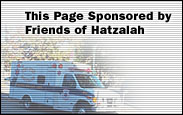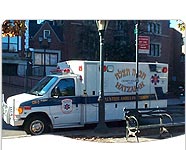 
We are often asked to explain what constitutes a medical emergency and by extension, what warrants a call to Hatzalah.
Clearly in any situation where there is even the slightest possibility that a delay in obtaining medical attention would endanger life or limb, one should call Hatzalah's emergency number (718) 387-1750 without delay.
But while a patient experiencing chest discomfort or slurring his/her speech clearly falls into the above category, there are some situations that are less clearly defined. While a detailed discussion of every conceivable scenario is impractical and unnecessary, there are some common situations where some guidelines (along with common sense) might be helpful.
Childbirth:
Emergency childbirth is generally the result of inadequate advance planning and/or poor judgment on when to proceed to the hospital.
Advance planning includes: Knowing in advance who will take you to the hospital (or having the phone numbers to several car services handy along with some cash), who will watch the other children (if any) when you go, packing up a bag with some necessities etc. All this should be done several weeks before the anticipated due date.
Knowing when to leave to the hospital is a little more difficult and every case needs to be judged individually. As a general guideline, some experts recommend waiting until contractions are around 10 minutes apart (5 minutes for a first time mother) and each contraction lasts around 45 seconds or more. Discuss this with your obstetrician in advance.
Note regarding Shabbos: Some Rabbonim have stated that the preferred way for a woman to proceed to the hospital on Shabbos or Yom Tov is by ambulance. This refers to areas where ambulances are staffed by non-Jewish personnel. In a neighborhood like Crown Heights there is no reason to call Hatzalah unless there are extenuating circumstances or delivery appears imminent. Otherwise a non-Jewish car service should be called and as stated above, proper planning before Shabbos is necessary, which includes having the phone number of the car service and some money set aside to pay the driver.
High fever:
Fever itself is generally NOT dangerous! The amount of temperature required to hurt the human brain is over 106 F. (Seizures due to fever can occur in the age range of 4 months to 6 years, but is most often associated with an abrupt rise in temperature, rather than an extremely high fever.)
On the other hand, while fever is not dangerous, it is a sign of infection, and there are some infections that are dangerous. Always consult your physician if you suspect a serious illness.
Temperature can be brought down by taking Tylenol or Motrin and sponging with lukewarm water (cold water is not recommended). Alcohol should not be used, since there is a small risk of alcohol poisoning.
If the fever is accompanied by serious symptoms such as seizures (not shivering or chills), a change in mental status, difficulty breathing etc. call Hatzalah immediately.
Burns:
Minor burns that are smaller than the size of the patient's palm rarely pose any immediate danger. After applying cold water or a cool compress (to stop the burning process and sooth pain) one should consult a physician and follow his advise. (Failure to do so could lead to eventual complications, such as infection and/or scarring.) For more serious burns call Hatzalah and cool the burn while awaiting their arrival. Particularly dangerous are burns that involve smoke inhalation, interfere with breathing, involve more than 10% of the body or completely surround the circumference of any part of the body.
Electrical Burns are an exception to the rule of the size of the burn. Most electrical burns will be much smaller than the palm of the hand but can be serious and/or fatal. Immediate medial attention is required and Hatzalah should be called. DO NOT touch the patient if he/she is still in contact with a live wire. You are a conductor as well and will suffer injury by transferring the electrical current to your self. Rather try to separate the patient from the electric current by either kicking the electrical wire away with a wooden broom or other material that will not transfer the current.
NOTE: A common cause of burns is excessively hot tap water. Check that the thermostat on your hot water boiler is set at 125 degrees or lower. Higher temperature settings (or the "very hot" setting on some models) can result in serious or fatal burns ch"v.
Orthopedic injuries:
Orthopedic injuries include sprains (ligament injury), strains (muscle/tendon injury), fractures and dislocations. Severe injuries which result in angulated, deformed or unstable limbs, require splinting by trained personnel to prevent additional injury and expeditious transport to an appropriate medical facility. The vast majority of orthopedic injuries do not require ambulance transport. Call your physician for guidance as to whether to schedule an office visit or go directly to an emergency room. Rest, ice and elevation are generally indicated and Advil or Motrin may be helpful to control pain and swelling. Consult your physician.
Lacerations (cuts):
The first concern is to control any bleeding, if present. This is usually easy to accomplish by applying direct pressure to the wound with a gauze pad, clean towel, or even directly with your hand if nothing else is available. Removing the pressure every few seconds to check if the bleeding has stopped is the best way to ensure that it continues indefinitely. Instead maintain the pressure for 5-10 minutes. If the wound is on an extremity, elevating that extremity may also be helpful.
For minor cuts, wash gently with mild soap and water. If the wound is deep or gaping, or if scarring is a concern, consult your physician for possible suturing or referral to a plastic surgeon.
Important note:
Some people have a tendency (especially on Shabbos) to search for an individual Hatzalah member in an emergency, either by going to their home or going to shul etc. This can result in significant delays in obtaining help and is strongly discouraged in cases involving potentially serious illness or injury. Calling the Hatzalah emergency number is the most reliable way to obtain help quickly.
When in doubt, always call Hatzalah's Emergency number (718) 387-1750.
|









